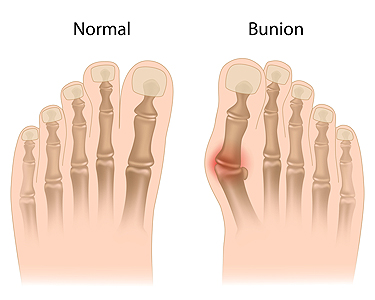How Runners Can Address Troublesome Bunions
Tuesday, 05 July 2022 00:00 Running is one of the most popular and widespread forms of exercise. Yet, bunions can often make this activity challenging or even painful. There are a variety of ways that individuals can manage the effects of bunions and continue to run. Bunions are bumps that occur usually on the base of the big toe when the metatarsophalangeal joint is stressed and strained. In some cases, bunions may form at the base of the pinky toe as well. If a runner has developed a bunion that is not causing serious pain, the runner may be able to continue running with wider footwear. Opting for wider running shoes can decrease the extent to which the bunion rubs up against the shoe and further aggravates or inflames the bump. Another way that runners may cope with bunions is by applying ice to the affected area for a short duration of time following the run. Toe spacers and bunion pads may also prove to be useful for runners looking to manage the annoyance of bunions. Bunions are certainly not ideal for runners, but a podiatrist may be able to help you address the affliction and get back on the running trail comfortably again.
Running is one of the most popular and widespread forms of exercise. Yet, bunions can often make this activity challenging or even painful. There are a variety of ways that individuals can manage the effects of bunions and continue to run. Bunions are bumps that occur usually on the base of the big toe when the metatarsophalangeal joint is stressed and strained. In some cases, bunions may form at the base of the pinky toe as well. If a runner has developed a bunion that is not causing serious pain, the runner may be able to continue running with wider footwear. Opting for wider running shoes can decrease the extent to which the bunion rubs up against the shoe and further aggravates or inflames the bump. Another way that runners may cope with bunions is by applying ice to the affected area for a short duration of time following the run. Toe spacers and bunion pads may also prove to be useful for runners looking to manage the annoyance of bunions. Bunions are certainly not ideal for runners, but a podiatrist may be able to help you address the affliction and get back on the running trail comfortably again.
If you are suffering from bunions, contact one of our podiatrists of Coastal Foot & Ankle Wellness Center, LLC. Our doctors can provide the care you need to keep you pain-free and on your feet.
What Is a Bunion?
A bunion is formed of swollen tissue or an enlargement of boney growth, usually located at the base joint of the toe that connects to the foot. The swelling occurs due to the bones in the big toe shifting inward, which impacts the other toes of the foot. This causes the area around the base of the big toe to become inflamed and painful.
Why Do Bunions Form?
Genetics – Susceptibility to bunions are often hereditary
Stress on the feet – Poorly fitted and uncomfortable footwear that places stress on feet, such as heels, can worsen existing bunions
How Are Bunions Diagnosed?
Doctors often perform two tests – blood tests and x-rays – when trying to diagnose bunions, especially in the early stages of development. Blood tests help determine if the foot pain is being caused by something else, such as arthritis, while x-rays provide a clear picture of your bone structure to your doctor.
How Are Bunions Treated?
- Refrain from wearing heels or similar shoes that cause discomfort
- Select wider shoes that can provide more comfort and reduce pain
- Anti-inflammatory and pain management drugs
- Orthotics or foot inserts
- Surgery
If you have any questions, please feel free to contact one of our offices located in St. Augustine, and Palatka, FL . We offer the newest diagnostic and treatment technologies for all your foot care needs.







